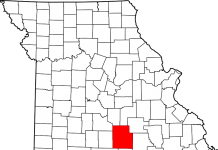As the last July Back the Blue Interview, we spoke to Chris Degase, the Sheriff of Douglas County. Degase speaks with us about his experiences in law enforcement, his favorite community programs, and advice he would give to someone looking to get into law enforcement. Listen below for the full story:
Transcript Below:
Dan Williams:
This is Dan here with Ozark Radio News, and I’m here talking with the Sheriff of Douglas County, Chris Degase. Degase, how are you today?
Chris Degase:
I’m good. How are you, sir?
Dan Williams:
I’m doing alright. So, I brought you in here as part of our Back the Blue interviews, and as part of that, I want to try to get to know the people that I’m talking to. How long have you been in the business of law enforcement?
Chris Degase:
I started in 1994 in the state of New Mexico. So I actually graduated the law enforcement academy there. I worked in New Mexico until the end of ’99 and moved back to Missouri in 2000.
Dan Williams:
So it’s been a few days, at least?
Chris Degase:
I’ve been in there a day or two. Yes, sir.
Dan Williams:
That does seem to be a trend, is that a lot of people who stick around past like about a two-year mark, they’re there for life. I imagine the stresses must get to people in a lot of ways. It must be very fulfilling for people to stick around with it as long as they do. Segueing into that, experiences that you might have run into, as not just in law enforcement, but as a sheriff, what are some standout experiences or things that have sort of impacted you in ways you didn’t expect?
Chris Degase:
I think that first, you have to find why you’re doing the job. If you’re going to stay in it, you have to understand, or be able to relate to why you’re doing it. A lot of people think it’s about writing tickets and arresting people, and it’s not. It’s about helping people. We run into that a lot, and I think those that get into law enforcement a lot of times think it’s about driving fast and having a gun and a taser and all that, when the reality of it is, is that we’re here to help people.
Chris Degase:
I think looking back, we’ve had some calls over the years to where some of the most fulfilling ones is when you’re able to help people. Whether it’s an elderly person who’s having issues getting food, and you get a call there as a check wellbeing and you go to the grocery store and you’re buying some groceries, or you give them a ride. Kids, being able to help kids is always huge. A lot of times we see the bad side of things in dealing with kids, but when you see that you’ve made a positive influence on somebody, I think that’s the most fulfilling.
Chris Degase:
Last night, I mean, it’s ironic that you asked that, because last night I’m on my way home and I seen this female in a yard and I thought, “Man, I think she has a warrant.” Last time I looked, she had a warrant, and about two weeks ago I’d arrested her for using fentanyl, heroin, meth. She was in really bad shape. So I pull in there and she’s like, “Hey, I got it all taken care of. I got my warrant taken care of, and here’s my completion of rehab,” and she had her certificate there and gave it to me. So that’s really what it’s about.
Dan Williams:
Yeah, that’s awesome, and I mean, I think a lot of people around here can also agree that it’s great to see a person kind of getting back up on their feet. We’re no stranger in this area to seeing friends, family kind of lost to that side of things, so it’s definitely a bright side whenever you could help somebody bounce back from that type of lifestyle. Talking about people within the community, I know you guys also get involved with community events. What are some of your favorite ones?
Chris Degase:
I think the two favorite ones that we do down there is we do something for Coats for Kids every year. So when I took office in 2009, we had the Shop with a Cop program, and that’s my other favorite one that we do. You go in there, and this is supposed to be a time for kids to be able to buy toys and stuff for Christmas, and we always had parents going, “Hey, can we use part of that money for coats? Our kids need coats.” So annually, we try to do something there. Over the years, we’ve done softball tournaments, we’ve done cornhole tournaments, we’ve done things to generate revenue, and then we go out and work with the schools and Division of Family Services and we buy coats and we give them to the schools, and the school kind of gets them out anonymously. They do it as a drawing so that there’s not any type of repercussions or anybody making fun of anybody because they get a coat from us.
Chris Degase:
So, that’s one of my favorite ones, is that, and the Shop with a Cop. Then our other one that we started about five or six years ago was our foster kids dinner, and so we work with the Division of Family Services and the court system over there, and every year we do a Christmas dinner for the foster kids and the parents. We get to hand out presents to the kids and Santa Claus is there, and we get to play games with the kids. So it’s kind of an opportunity for my deputies to, and myself, get there and let these kids see us in a different light. Because many of them, we took. We took them from their parents and that’s how they ended up in foster care. So they get to see us on the other side of it is as hopefully the nice guy, not the person that took them away from their family.
Dan Williams:
Right, I understand that. Your experiences with law enforcement, I want to see if we can maybe stretch this out to anybody who might be interested in law enforcement, whether that’s just learning about it or actually joining the police forces or joining the sheriff’s departments or anything of that nature. Is there any advice you’d like to give to somebody who wants to be a newcomer?
Chris Degase:
I think that probably starting out, the best advice I could give is to find a job within one of your local sheriff or police offices. Maybe get in there as a dispatcher, get in there as a jailer, to see if that’s going to be your type of work. It’s not for everybody. I mean, I interviewed several people that think, “Hey, I can dispatch,” and we train them they get in there, and within a month they’re gone, just because of the stress that comes with it. Some of the best deputies that I have on the road right now started with me as a jailer or as a dispatcher, and they kind of worked their way up and they worked through it. So I think if you’re interested in that, you should try to get with one of your local law enforcement agencies and do that, and maybe do some ride-alongs if they have a ride-along program.
Chris Degase:
And if that’s something that you’re interested in, I think that the days of just going through a basic law enforcement academy and coming out as an officer are kind of fading off a little bit. I know that there’s some programs out and around that will help you get your associate’s degree and then go through the academy, and I think that that’s huge, to get that education behind you. I think you need that education behind you in order to do this job now and survive this job.
Dan Williams:
So it kind of sounds like, to outline the ideal career path, would be to get involved as a dispatcher or a jailer, get your education while you’re doing that, and then see if an officer position is right for you?
Chris Degase:
Yeah, and I think that’s giving you an honest shake at it, for lack of better words, is that now you know what you’re getting into. And I do that with the people that I hire into the dispatch position, I’m like, “Hey, this isn’t for everybody. It’s hard,” and the same thing with the jail, and I always like them to come in and try it out for a day before we hire on and just see if it’s for them. But yeah, that would be the appropriate steps I think, because I mean, I have seen law enforcement officers over the years, they jump in, they go through the academy, they come out and they’re like, “Man, this isn’t what I thought it was going to be,” and then they get out of it. So I think it takes that person with that alpha personality, that willingness to go the extra mile, to be able to do this job.
Dan Williams:
Well, thanks for talking with us, Chris. I think that pretty well sums up this interview. I’d like to get you in here for some more interviews later on.
Chris Degase:
Sure.
Dan Williams:
But we’ll discuss that when the time comes.
Chris Degase:
Absolutely. Thank you.
Dan Williams:
Yeah, thanks.






